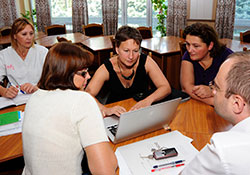WHO/Europe strengthens laboratory core capacities

WHO
Well-functioning, sustainable laboratory services, operating according to international principles of quality and safety, are an essential part of strong health systems and are crucial to improving public health. The analyses they provide offer a reliable foundation for evidence-based control of disease outbreaks, robust surveillance of adverse events associated with pharmaceutical or vaccine use and earlier treatment of both acute and chronic diseases.
WHO/Europe supports countries’ efforts to strengthen and develop laboratory core capacities required under the IHR, by improving the overall quality of their laboratory services, whether these be for public health or clinical diagnostic purposes, and as part of early warning and response. This is done through the development of national policies and strategies, coupled with sustainable training programmes, in line with WHOs’ global vision on laboratory quality.
In collaboration with our partner the Royal Tropical Institute, Amsterdam (KIT), we recently launched the “Better Labs for Better Health” initiative, to intensify the efforts of three countries in this area (Kyrgyzstan, Republic of Moldova and Tajikistan). This initiative aims to build a broad platform of partners and stakeholders working in the area of laboratory capacity strengthening, to make best use of resources and be sustainable in the long-term. If carried out successfully, it will not only improve health systems and overall public health in the three countries concerned but will serve as a model that can be applied in developing countries throughout the Region and beyond.
Goals:
- Enhance laboratory capacity and improve laboratory services, thereby improving health systems
- Create a model for laboratory services strengthening
Expected outcomes:
- National-owned laboratory policies and strategies, integrated with existing health strategies, developed for three countries involved in the project.
- International Master of Science in Laboratory Management obtained by 45 persons.
- Teaching laboratories upgraded and in-country training in modern laboratory techniques provided to 300 laboratory staff .
For more information please write to euinfluenza@who.int



